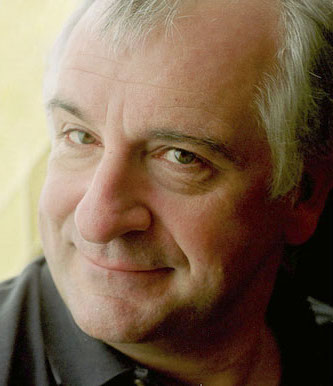The Hitchhiker's Guide to the Future (2001)
Context: It's important to remember that the relationship between different media tends to be complementary. When new media arrive they don't necessarily replace or eradicate previous types. Though we should perhaps observe a half second silence for the eight-track. — There that's done. What usually happens is that older media have to shuffle about a bit to make space for the new one and its particular advantages. Radio did not kill books and television did not kill radio or movies — what television did kill was cinema newsreel. TV does it much better because it can deliver it instantly. Who wants last week's news?
Douglas Adams Quotes
“Dirk was unused to making such a minuscule impact on anybody.”
Source: The Long Dark Tea-Time of the Soul (1988), Ch. 6
Context: Dirk was unused to making such a minuscule impact on anybody. He checked to be sure that he did have his huge leather coat and his absurd red hat on and that he was properly and dramatically silhouetted by the light of the doorway.
He felt momentarily deflated and said, "Er..." by way of self-introduction, but it didn't get the boy's attention. He didn't like this. The kid was deliberately and maliciously watching television at him.
“I am fascinated by religion. (That's a completely different thing from believing in it!)”
The Salmon of Doubt (2002)
Context: I am fascinated by religion. (That's a completely different thing from believing in it!) It has had such an incalculably huge effect on human affairs. What is it? What does it represent? Why have we invented it? How does it keep going? What will become of it? I love to keep poking and prodding at it. I've thought about it so much over the years that that fascination is bound to spill over into my writing.
“Generally, old media don't die.”
The Hitchhiker's Guide to the Future (2001)
Context: Generally, old media don't die. They just have to grow old gracefully. Guess what, we still have stone masons. They haven't been the primary purveyors of the written word for a while now of course, but they still have a role because you wouldn't want a TV screen on your headstone.
“This was the evening of the last day of Gordon Way's life”
Dirk Gently's Holistic Detective Agency (1987)
Context: This was the evening of the last day of Gordon Way's life … The weather forecast hadn't mentioned that, of course, that wasn't the job of the weather forecast, but then his horoscope had been pretty misleading as well. It had mentioned an unusual amount of planetary activity in his sign and had urged him to differentiate between what he thought he wanted and what he actually needed, and suggested that he should tackle emotional or work problems with determination and complete honesty, but had inexplicably failed to mention that he would be dead before the day was out.
“What's so unpleasant about being drunk?"
"Ask a glass of water!”
Variant: It's unpleasantly like being drunk."
"What's so unpleasant about being drunk?"
"You ask a glass of water.
Source: The Hitchhiker's Guide to the Galaxy
“Life,” said Marvin dolefully, “loathe it or ignore it, you can’t like it.”
Source: The Hitchhiker's Guide to the Galaxy
Source: The Long Dark Tea-Time of the Soul (1988), Ch. 4
Source: The Hitchhiker's Guide to the Galaxy
“What I need… is a strong drink and a peer group.”
Source: Life, the Universe and Everything
Source: The Hitchhiker's Guide to the Galaxy
Source: The Hitchhiker's Trilogy
“There was a point to this story, but it has temporarily escaped the chronicler's mind.”
Source: So Long, and Thanks for All the Fish
Source: The Restaurant at the End of the Universe
The Salmon of Doubt (2002)
Source: Douglas Adams, The Restaurant at the End of the Universe (Hitchhiker's Guide to the Galaxy, #2)
Source: The Restaurant at the End of the Universe
Source: Dirk Gently's Holistic Detective Agency
“In an infinite Universe anything can happen.”
Source: The Restaurant at the End of the Universe
Source: The Restaurant at the End of the Universe
Source: So Long, and Thanks for All the Fish
“Oh dear,' says God, 'I hadn't thought of that,' and promptly vanishes in a puff of logic.”
Source: The Ultimate Hitchhiker's Guide to the Galaxy
Source: So Long, and Thanks for All the Fish
Source: The Hitchhiker's Guide to the Galaxy
“We are not an endangered species ourselves yet, but this is not for lack of trying.”
Source: Last Chance to See
Source: So Long, and Thanks for All the Fish
“Beppu (n.)
The triumphant slamming shut of a book after reading the final page.”
Source: The Deeper Meaning of Liff
“If they don’t keep exercising their lips, he thought, their brains start working.”
Source: The Hitchhiker's Guide to the Galaxy
Source: Dirk Gently's Holistic Detective Agency
“Alltami (n.)
The ancient art of being able to balance the hot and cold shower taps.”
Source: The Deeper Meaning of Liff
Source: Dirk Gently's Holistic Detective Agency
“The hotel shop only had two decent books, and I'd written both of them.”
Source: The Salmon of Doubt (2002)
Source: The Hitchhiker's Guide to the Galaxy
Source: Life, the Universe and Everything
Source: The Deeper Meaning of Liff
